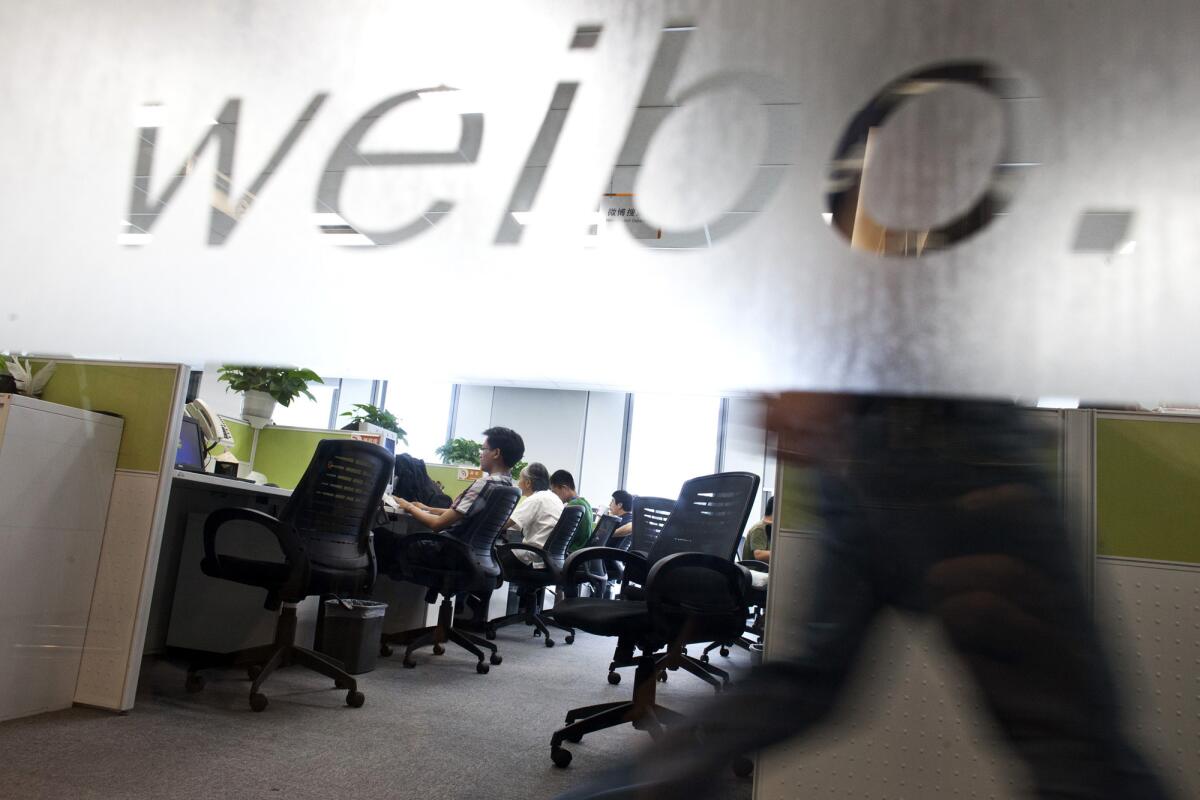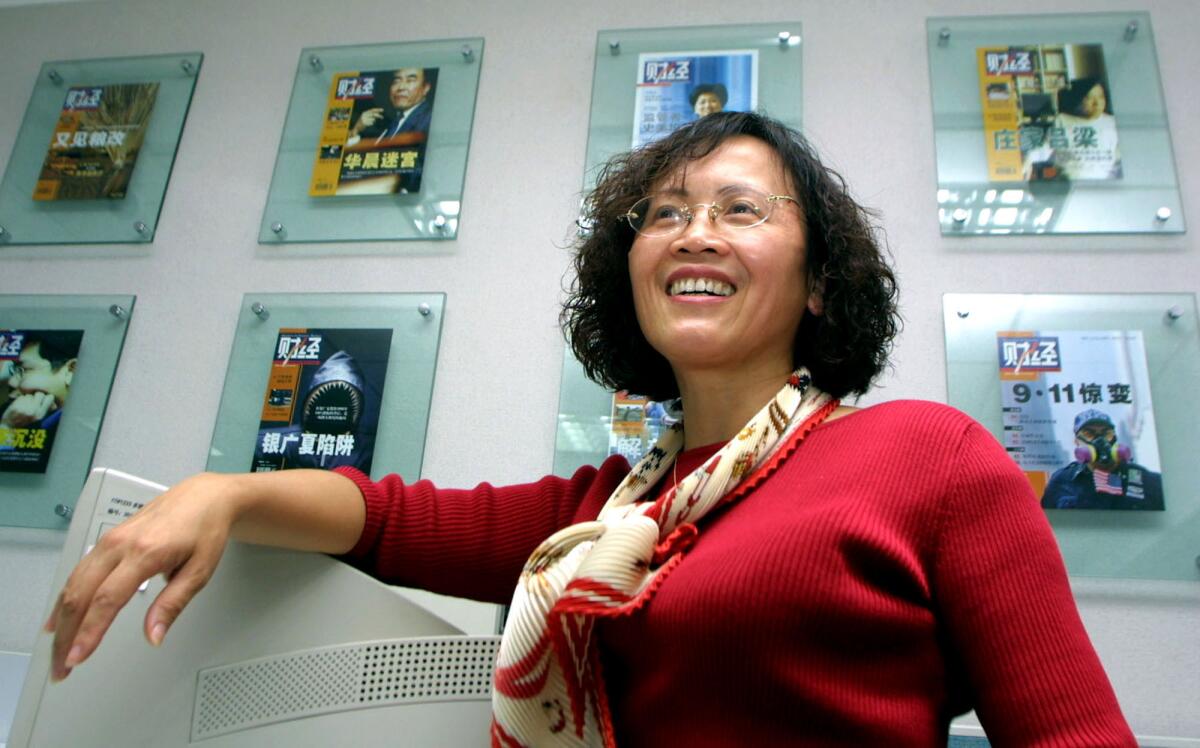Some prominent Chinese are chafing against censorship. Then their complaints are censored
- Share via
Reporting from Beijing — The editor-in-chief of China’s Global Times, a tabloid closely tied to the Communist Party and known for its often-rabid nationalism, isn’t exactly the kind of guy you’d expect to be calling publicly for more freedom of speech and less censorship.
But that’s precisely what Hu Xijin has been doing lately — and he’s not alone. A number of high-profile media figures in China, a prominent businessman, and even a delegate to the national legislature have been complaining that the administration of President Xi Jinping is going too far to snuff out criticism.
This week, Hu took to Weibo, China’s oft-censored Twitter equivalent, to say that authorities were relying too much on the “Great Firewall” that blocks Chinese users from seeing thousands of websites. The post was later deleted.
Last month, he went on Weibo to declare that China should “open up more channels for criticism and suggestions and encourage constructive criticism.”

The Bejing office of Sina Weibo, China’s oft-censored Twitter equivalent.
The stakes are high. Xi has shown a growing impatience for dissent. Under his leadership, hundreds of bloggers, activists, lawyers, journalists and academics have been detained or harassed for refusing to toe the party line.
The party has not been shy about its goals: Last fall, authorities introduced a new policy forbidding members to engage in “improper discussion” of central party policies. After Xi demanded that officials close ranks around him, China’s state-run media ramped up references to Xi as the “core” — a leader on par with Deng Xiaoping, who led China’s opening following the death of Mao Tse-tung.
Last month, Xi made a high-profile tour of the People’s Daily, the Xinhua News Agency and CCTV — China’s three major state-run media outlets — ordering editors and reporters to pledge loyalty to the party.
“They must love the party, protect the party and closely align themselves with the party leadership in thought, politics and action,” he said.
While such diktats don’t sit well with many Chinese, speaking out against them is risky. But in early March, a prominent Shanghai academic who is a member of a national-level political advisory body did just that.
On the eve of his organization’s annual gathering in Beijing, Jiang Hong argued that advisors such as himself should “be free to give Communist Party and government agencies suggestions on economic, political, cultural and societal issues.” He had the audacity to suggest that if authorities feel that an ordinary citizen has made an “illegal” remark, they should say what law they believe the person has violated.
Jiang was interviewed about his proposals by Caixin, a prominent current affairs magazine. After the interview was published, though, it quickly was taken offline.

Hu Shuli, managing editor of the current affairs magazine Caixin, poses in her Beijing office in 2002. The magazine recently ran an article about an online post it said China’s Internet watchdog had ordered removed.
But Caixin, run by a well-regarded journalist, Hu Shuli, then took the unusual step of posting a story on its English-language platform about the post’s removal. Under the headline “Story about advisor’s free speech comments removed from Caixin website,” the publication said the Cyberspace Administration of China — the nation’s Internet watchdog — had ordered the removal.
An illustration accompanying the piece depicted a mouth covered with masking tape. That article, too, was soon deleted.
To many people overseas, China’s debate over the limits of free speech may seem like a nonstarter — after all, the country is a one-party state where the government routinely censors the Internet; blocks foreign news websites as well as Google, Twitter and Facebook; exerts strong control over media outlets; forbids demonstrations; and detains and jails critics.
But over the last decade, the expansion of the Internet and China’s increasing efforts to join the international community — such as hosting the 2008 Summer Olympics and the 2014 Asia-Pacific Economic Cooperation forum — have contributed to a gradual opening of space for critical debate on topics ranging from the environment to the economy. Some online commentators developed large followings online, earning them the moniker “Big Vs” or Big Voices.
Among them was Ren Zhiqiang, a Communist Party member and real estate mogul nicknamed “the Cannon” for his outspoken commentaries. After Xi’s tour to the state-run media outlets, he went online to gripe: “When did the ‘People’s Government’ turn into the ‘Party’s Government’? Does it run on party dues?”
The previous month, Ren had raised eyebrows when he expressed concern over Xi’s ideological policies and wrote: “The winds of the Cultural Revolution are once again blowing.” (During Mao’s Cultural Revolution, a political movement from 1966 to 1976, millions of people were persecuted in the name of Communist ideology).
Ren’s Weibo account — with some 37 million followers — was deleted by authorities last month. In a rare comment on an individual case, Cyberspace Administration spokesman Jiang Jun said: “Cyberspace is not outside of the law, and no person is allowed to use the Internet to spread illegal information.”
Although some continue to speak up — on March 7, Xinhua News Agency reporter Zhou Fang published an open letter chastising Beijing for suppression of free speech — the tightening controls are prompting some influential figures to throw in the towel. On Tuesday, a senior editor at the Guangzhou-based Southern Metropolis Daily, one of China’s top newspapers, resigned.
“I’m getting old; after bowing for so long, I can’t stand it anymore,” Yu Shaolei wrote on his Sina Weibo microblog.
Whether frustration over Xi’s policies extends high into party ranks is unclear. In early March, an anonymous letter briefly circulated online, blaming Xi for creating “unprecedented problems and crises” by adopting a hardline authoritarian leadership style. It was signed “loyal Communist Party members.”
As news of that letter spread, authorities detained scores of people in an attempt to identify its source. Two exiled Chinese bloggers who wrote about the document — one living in New York, the other in Germany — said that police targeted their family members in China.
Chang Ping, the Germany-based writer, said police detained his two brothers and pressured them to persuade Chang to stop publishing articles criticizing the Chinese government.
Both bloggers say their family members have since been released.
“In recent years, this kind of thing wouldn’t happen in China. But China is getting stricter and stricter. It’s like, it doesn’t matter what country you live in — I can hurt you,” Chang said. “This kind of thing is a strike against media freedom.”
Special correspondent Violet Law in Chicago and Nicole Liu of The Times Beijing bureau contributed to this report.
Follow @JulieMakLAT and @JRKaiman for news from China
More to Read
Sign up for Essential California
The most important California stories and recommendations in your inbox every morning.
You may occasionally receive promotional content from the Los Angeles Times.














